On the morning of October 31 local time in Botswana, the unveiling ceremony of the Confucius Institute at the Botswana International University of Science and Technology (BIUST) was grandly held in the auditorium of the university. Zhao Dingxuan, President of Yanshan University (YSU), led the members of the Chinese council, while Otlogetswe Totolo, Vice Chancellor of BIUST, led all university leaders and heads of middle-level units to attend the unveiling ceremony.
Also present at the event were Guo Zhenguang, Charge d'Affaires a.i. of the Chinese Embassy in Botswana, local chiefs from the Palapye District, members of the Palapye Council, district committees, police stations, administrative management committees, educational offices, tax offices, banks, secondary schools, as well as representatives from over 30 Chinese-funded enterprises such as Zhonggan Construction, and the Chinese and foreign deans of the Confucius Institute at the University of Botswana, totaling more than a hundred people.
The unveiling ceremony began with the solemn national anthems of both countries. Mr. Totolo first delivered a welcome speech, warmly welcoming the delegation and all the guests. He stated that the teaching of the Chinese language is in line with BIUST’s vision of promoting industrial and diversified knowledge economy growth in Botswana. He mentioned that the Chinese language and culture courses have been offered at BIUST for eight years, and the establishment of the Confucius Institute holds significant meaning, marking a milestone in the cooperation between YSU and BIUST and the continuation and elevation of friendship between China and Botswana.
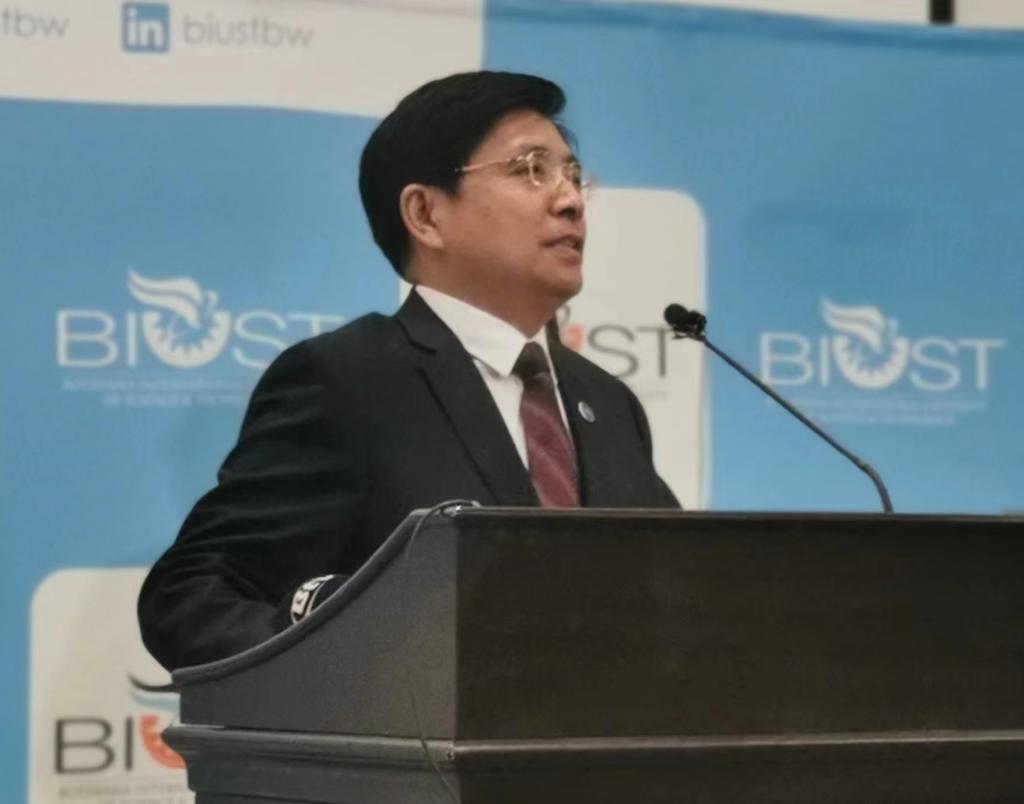
Zhao Dingxuan delivers a keynote speech
Zhao Dingxuan delivered a keynote speech. He expressed that with joy and excitement, both sides jointly witnessed a historic moment in the exchange and cooperation between the two universities. He highly praised the effective overcoming of challenges such as the impact of the COVID-19 pandemic and the efficient completion of the application and approval process for the Confucius Institute in a short period of time. He pointed out that the Confucius Institute, upholding the concept of "harmony is precious" and "harmony without uniformity," has not only facilitated cultural exchange between China and the rest of the world but also provided a solid platform for China to engage in meaningful cooperation with other nations in fields such as education and trade. The Institute stands as living proof of China's successful global outreach. The Confucius Institute at the BIUST, as the second Confucius Institute in the Republic of Botswana, will fully integrate the characteristic disciplines of both universities, which excel in engineering and science. It will adopt a training model combining "Chinese language + vocational skills," providing a broader platform for Chinese language learners at the Botswana International University of Science and Technology, the Palapye District, and even the Northern District of Botswana to gain a deeper understanding of the Chinese language and culture. This will undoubtedly enhance mutual understanding between the two universities and between the people of the two countries, and will have a profound impact on the cooperative development between China and Botswana.
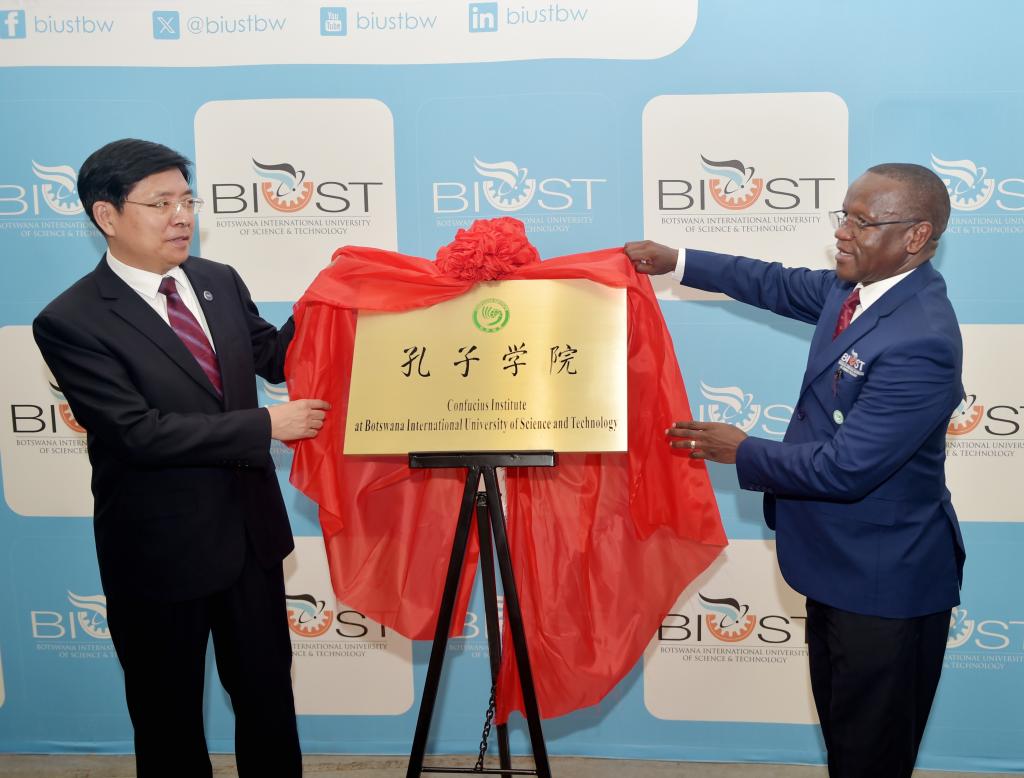
Zhao Dingxuan and Totolo unveil the Confucius Institute at the BIUST
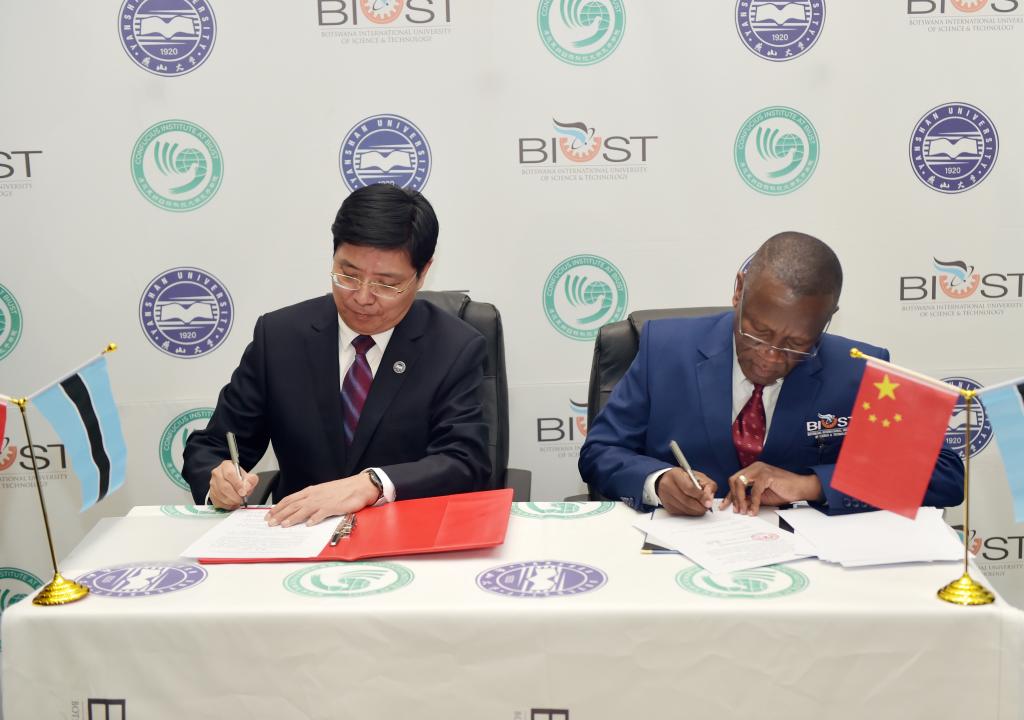
Zhao Dingxuan and Totolo sign the agreement to jointly establish the Confucius Institute
Later, Zhao Dingxuan and Totolo, representing their respective universities, formally signed the agreement to jointly establish the Confucius Institute and unveiled the Confucius Institute at the BIUST, which elevated the atmosphere to a climax. Guo Zhenguang, Charge d'Affaires a.i. of the Chinese Embassy in Botswana, delivered a congratulatory speech. He expressed regrets on behalf of Ambassador Wang Xuefeng, who was unable to attend the unveiling ceremony due to official duties, and warmly congratulated the successful hosting of the unveiling ceremony for the Confucius Institute at the BIUST. He pointed out that the establishment of the Confucius Institute at the BIUST is an important achievement in educational cooperation between China and Botswana, and it is also a significant symbol of implementing the "Belt and Road" initiative. He expressed hope that the Confucius Institute at the Botswana International University of Science and Technology will make more achievements in training Chinese language talents, conducting cultural exchanges between China and Botswana, and strengthening educational cooperation between the two countries, further promoting mutual understanding and communication between the peoples of China and Botswana.
At the unveiling ceremony, Professor Patricia Makepe, Director of the Centre for Business Management, Entrepreneurship and General Education at the BIUST, reviewed the joint establishment of the Confucius Institute by the two universities before the guests. BIUST students also presented wonderful performances including the lively traditional dance, Botswana traditional poetry, Chinese kung fu, and Chinese songs. The event concluded in a joyous and celebratory atmosphere.
After the unveiling ceremony, Zhao Dingxuan accepted an exclusive interview with Xinhua News Agency. Subsequently, the two universities held a cooperative negotiation meeting, which was attended by the entire leadership of BIUST, the relevant officials of the President's Office, the International Affairs Office, the Centre for Business Management, Entrepreneurship and General Education, the Faculty of Engineering, and the College of Science, and the student union president. The presidents of the two universities introduced their respective basic situations and recent achievements, and engaged in in-depth discussions on mutually interesting areas and future cooperation projects. The two universities reached a consensus on various areas of cooperation, including jointly managing the Confucius Institute, promoting faculty and student exchanges, internships, practical training, research collaboration, and result commercialization.
After the symposium, council members from both the Chinese and Botswana sides of the Confucius Institute at the BIUST held their first meeting. They engaged in detailed discussions on specific matters such as the cooperation agreement for jointly establishing the Confucius Institute, initiating funding applications, selecting Chinese and foreign deans, as well as applying for teaching positions and volunteer placements.
On October 30, the YSU delegation arrived in Palapye, the location of BIUST. Professor Elisha Shemang, Vice Chancellor of BIUST, led relevant department heads to personally greet the delegation at their residence. President Totolo hosted a special welcome dinner to warmly welcome the delegation, accompanied by officials from the President's Office, International Affairs Office, Centre for Business Management, Entrepreneurship and General Education, and other relevant departments of BIUST.
On November 1, Mr. Totolo personally accompanied the delegation on a visit to the BIUST library, laboratories at the Faculty of Engineering and the College of Science, and faculty housing at BIUST. He provided a detailed introduction to BIUST's teaching and research conditions, as well as the work and living environment provided for future YSU dispatched personnel.
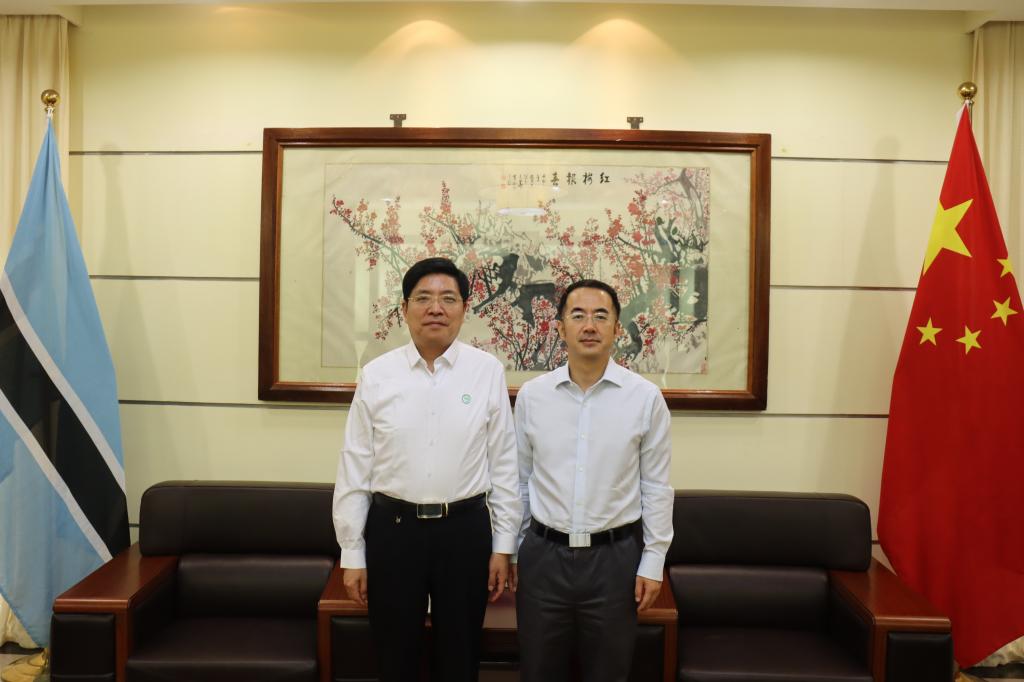
Guo Zhenguang meets with Zhao Dingxuan
On November 2, the delegation made a special trip to visit the Embassy of the People's Republic of China in the Republic of Botswana, located in the capital city of Gaborone. They were warmly received by the Charge d'Affaires, Guo Zhenguang. Zhao Dingxuan gave a detailed introduction to Guo Zhenguang about the current status of YSU and the achievements it has made in scientific research, talent cultivation, and other areas in recent years. He expressed the hope that under the guidance of the embassy, the Confucius Institute at the BIUST could better serve as a bridge and link for exchanges and cooperation between the two universities and even between the two countries. Guo Zhenguang highly praised YSU’s achievements and briefly introduced the Republic of Botswana and the cooperation between Botswana and China in various fields. He stated that educational cooperation is an important part of bilateral relations, and the embassy has an important role to play in promoting cultural and educational exchanges as well as implementing the "Belt and Road" initiative. He expressed hope that the two universities make full use of the Confucius Institute as a platform to explore cooperation in more areas and that YSU can help BIUST promote and transform scientific research results, benefiting the people of both universities and countries.
Before the delegation's departure, Davies Tele, Vice Chancellor of BIUST, drove nearly 300 kilometers from Palapye to Gaborone to bid farewell to the delegation on behalf of BIUST.
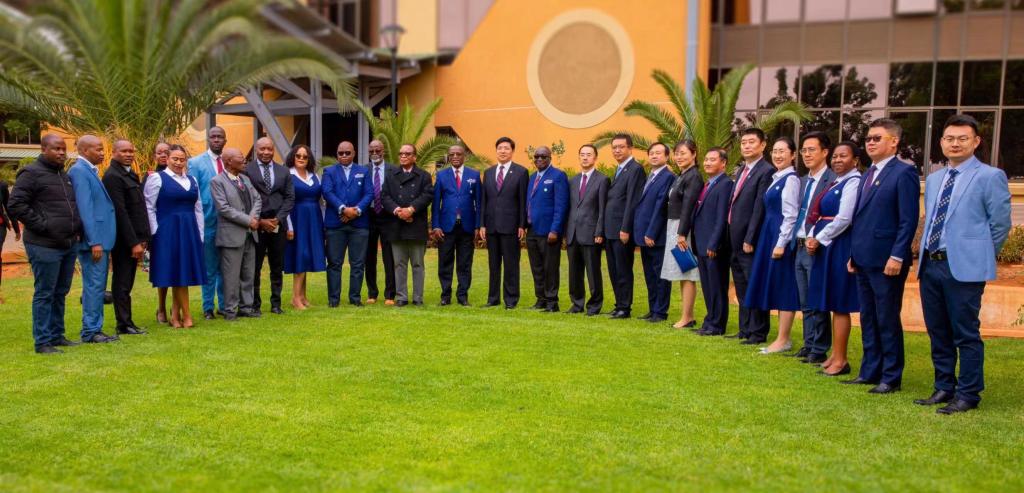
Group photo of representatives in attendance
The unveiling ceremony of the Confucius Institute was a complete success, officially kicking off the joint establishment of the Confucius Institute by the two universities. Through a series of visiting and exchange activities, the delegation enhanced mutual understanding and trust, strengthened and developed intercollegiate relationships, and enriched the content of intercollegiate cooperation. The Confucius Institute at the BIUST is one of the first batch of Confucius Institutes approved after the pandemic, successfully achieving approval and unveiling in the same year, representing a significant breakthrough in the international exchange of YSU and Hebei Province. The Confucius Institute at the BIUST is the second Confucius Institute established by YSU in the world, which has achieved a historic breakthrough in substantive cooperation between YSU and African universities, and demonstrated the comprehensive strength of YSU in promoting international Chinese education and providing education internationally, and is of great and long-lasting significance for YSU to enhance the level of international education in the new era, integrate into the "Belt and Road Initiative" education action, and serve China to strengthen the international communication capacity.